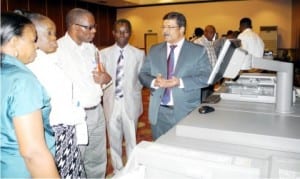Business
FCMB Lists N26bn Bond On FMDQ OTC Platform

Deputy General Manager, Sharp Altect International, Mr Varghese Gorge (right), speaking to newsmen at the live demonstration of New Age Digital Printing and Finishing in Abuja, last Monday. With him is the Managing Director, First October Global Resources Ltd, Mr Wale Akindele (2nd right)
FMDQ OTC on Monday, recorded another feat with the listing of FCMB PLC’s N26 billion SPV bond on its platform.
The listed Bond is Series 1 of FCMB 7-year 14.25 per cent Fixed Rate Subordinated Unsecured Bond due for Nov. 20, 2021 under a N100 billion debt issuance programme.
The Tide source reports that this followed the listings of the N30.5billion UBA Bond, N15.54bn Stanbic IBTC Bond, N4.8trn FGN Bonds and quotation of N2.8trn Nigerian Treasury Bills respectively, on the OTC securities exchange.
Speaking at the listing ceremony, Ms Tumi Sekoni, Group Head, Business Development FMDQ said that FMDQ recognised the growth potential of issuers of debt in the Nigerian capital market.
Sekoni said that FMDQ would continue to provide remarkable opportunity for the issuers to raise the profile of their issues and access a deep pool of funds.
Sekoni said that listing of debt securities on the OTC securities exchange provides a wide range of benefits across the debt market value chain.
She said that the Exchange’s initiatives to promote secondary market liquidity would contribute immensely to the growth in the overall domestic bond market.
Sekoni said that “issuers have the opportunity to leverage on the provisions of this unique exchange to meet their long term funding needs even as the financial markets become aligned with international best practices.”
Mr Ladi Balogun, the Group Managing Director, FCMB Plc, explained that the bond issue would serve as tier 11 capital which provides long term capital to support growth.
He said it would also reinforce the bank’s commitment to its customers at these challenging times.
Balogun said that the listing the FCMB SPV Bond on the FMDQ platform was hinged on the availability of a readily accessible liquid market to the bond holders.
He commended FMDQ’s efforts toward creating more depth in the Nigerian debt market.
He applauded the platform’s seamless processes and its drive to achieve market transparency by deploying technology initiatives.
Balogun said proceeds of the bond would be used to strengthen its capital base, enhance its capital adequacy ratio, expand distribution channels, infrastructure as well as grow its risk assets.
He said that the bond’s subscription level was 112 per cent, noting that the management of FCMB decided to accept only ¦ 26 billion.
Also speaking, Mr Tolu Osinibi, Executive Director, FCMB Capital Markets Ltd., said the FMDQ platform had encouraged the application of international best practices in the local trading environment.
Osinibi said that the platform would provides real-time market information, which would enable greater participation by market operators and significantly enhances liquidity.
He added that FMDQ market development initiatives had led to the revival of the Commercial Paper market, noting that the company should ensure introduction of more initiatives that would aid market growth.
Business
Agency Gives Insight Into Its Inspection, Monitoring Operations

Business
BVN Enrolments Rise 6% To 67.8m In 2025 — NIBSS

The Nigeria Inter-Bank Settlement System (NIBSS) has said that Bank Verification Number (BVN) enrolments rose by 6.8 per cent year-on-year to 67.8 million as at December 2025, up from 63.5 million recorded in the corresponding period of 2024.
In a statement published on its website, NIBSS attributed the growth to stronger policy enforcement by the Central Bank of Nigeria (CBN) and the expansion of diaspora enrolment initiatives.
NIBSS noted that the expansion reinforces the BVN system’s central role in Nigeria’s financial inclusion drive and digital identity framework.
Another major driver, the statement said, was the rollout of the Non-Resident Bank Verification Number (NRBVN) initiative, which allows Nigerians in the diaspora to obtain a BVN remotely without physical presence in the country.
A five-year analysis by NIBSS showed consistent growth in BVN enrolments, rising from 51.9 million in 2021 to 56.0 million in 2022, 60.1 million in 2023, 63.5 million in 2024 and 67.8 million by December 2025. The steady increase reflects stronger compliance with biometric identity requirements and improved coverage of the national banking identity system.
However, NIBSS noted that BVN enrolments still lag the total number of active bank accounts, which exceeded 320 million as of March 2025.
The gap, it explained, is largely due to multiple bank accounts linked to single BVNs, as well as customers yet to complete enrolment, despite the progress recorded.
Business
AFAN Unveils Plans To Boost Food Production In 2026
-

 Sports4 days ago
Sports4 days agoTinubu Lauds Super Eagles’ after AFCON bronze triumph
-

 Sports4 days ago
Sports4 days agoAFCON: Lookman gives Nigeria third place
-

 Sports4 days ago
Sports4 days agoFulham Manager Eager To Receive Iwobi, Others
-

 Sports4 days ago
Sports4 days ago“Mikel’s Influence Prevent Some Players Invitation To S’Eagles Camp”
-

 Sports4 days ago
Sports4 days agoMan of The Match award Excites Nwabali
-

 Sports4 days ago
Sports4 days agoRemo, Ikorodu set for NPFL hearing, Today
-

 Sports4 days ago
Sports4 days agoPolice Games: LOC inspects facilities in Asaba
-

 Niger Delta4 days ago
Niger Delta4 days agoINC Polls: Ogoriba Pledges To Continuously Stand For N’Delta Rights … Picks Presidential Form

